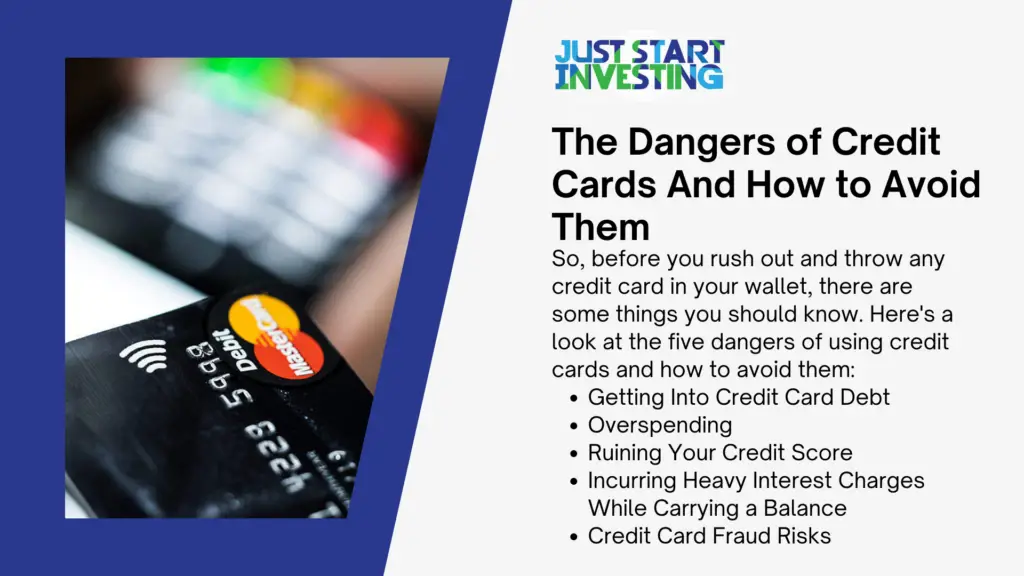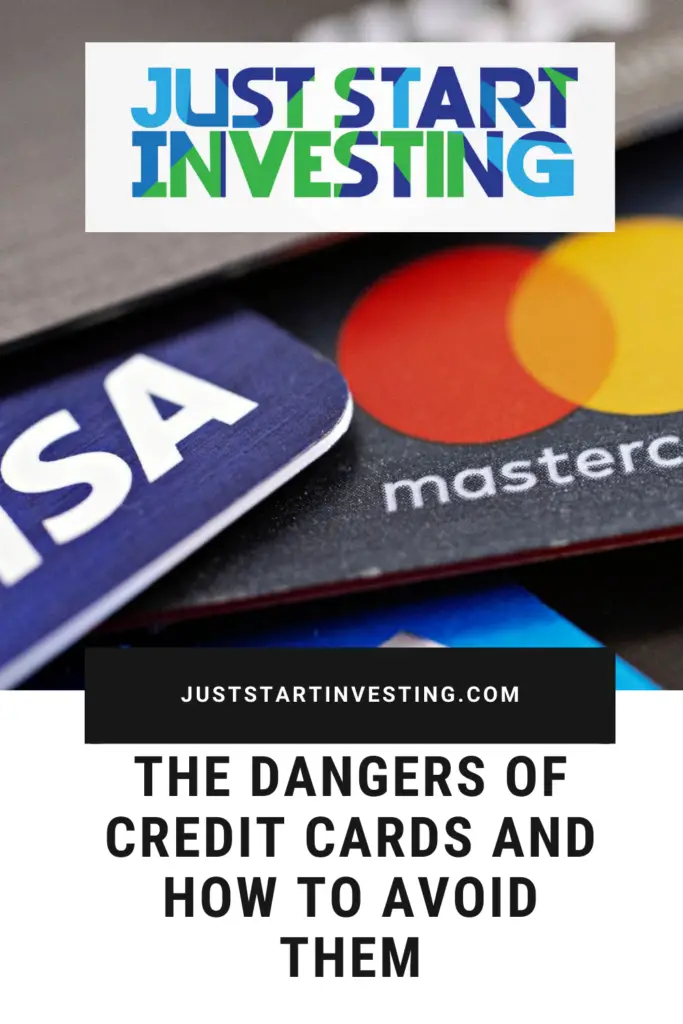Have you ever heard stories of people misusing their credit cards? Of course, you have. It’s something that happens all the time. And while it’s not uncommon for someone to overspend and rack up thousands of dollars in debt, you can take steps to prevent the dangers of credit cards happening.
The simple truth is that credit cards can be dangerous, especially for first-time cardholders who the allure of free money may sway – and not all of the danger is to your wallet. However, even those who are experienced with credit cards can fall victim to credit card traps.
Like most things in life, using a credit card can cause problems if you don’t use it responsibly or have explicit knowledge of how they work. Unfortunately, many consumers fall into credit card traps every day, and there are ways to avoid them.
Learn about the risk of credit cards to cultivate better credit card habits when applying for a credit card or deciding whether to drop your credit card.
Staying away from common mistakes and keeping a good credit score is essential. It will help you with future endeavors like buying a house or car, and it can even help you with future job opportunities.
So, before you rush out and throw any credit card in your wallet, there are some things you should know. Here’s a look at the five dangers of using credit cards and how to avoid them:
- Getting Into Credit Card Debt
- Overspending
- Ruining Your Credit Score
- Incurring Heavy Interest Charges While Carrying a Balance
- Credit Card Fraud Risks

5 Dangers Of Credit Cards Usage
Getting Into Credit Card Debt
In the wrong mindset about credit cards, you might be tempted to borrow more than you can afford to repay. You should not consider your credit limit as free money you can spend but rather as a loan extended to you by your credit card company.
Interest rates are generally associated with credit card balances. You’ll pay more interest each time you don’t pay your balance in full within the billing cycle. This can make clearing credit card debt more difficult.
You should never miss out on making your monthly credit card payments-but only making the minimum required monthly payment is close behind.
You’ll pay off your debt much more slowly if you only pay the minimum payments, as well as incurring more interest charges.
By borrowing money, you incur debt. The more you borrow without repaid, the deeper your debt becomes. There are many problems caused by debt, and not all of them are financial. However, the consequences of debt can be severe, from stress and depression to other health issues.
Think about it this way: If the limit on your credit card is $2,000, you don’t necessarily need to spend $2,000 that month if you can’t pay it off in full.
Because getting out of debt is much harder once you are in it. Debt consumes money that could be spent on other priorities, such as retirement or summer vacation savings. Paying your bills may mean having to delay your educational goals or feeling trapped in a job you don’t want.
To get a better sense of the situation, data shows that the average debt of American credit cards is $5,525 in 2021. And it has only been going up since 2003. Now that’s a number you don’t want to reach.
| YEAR | CREDIT CARD DEBT | TOTAL DEBT | CREDIT CARD DEBT PERCENTAGE |
| 2003 | $693 billion | $7.38 trillion | 9.4% |
| 2008 | $850 billion | $12.60 trillion | 6.7% |
| 2012 | $668 billion | $11.38 trillion | 5.9% |
| 2019 | $868 billion | $13.86 trillion | 6.3% |
| 2021 | $787 billion | $14.96 trillion | 5.3% |
The total amount of credit card debt in the U.S. reached an all-time high in 2019. Although total U.S. debt has increased throughout that period, credit card debt had fallen by over 15% since the fourth quarter of that year, when it peaked at $930 billion.
How to avoid: Be aware of the signs that you are heading into credit card debt, such as the inability to pay your balance in full each month. To avoid getting in over your head, stop using credit cards and live within your means instead. Keep an eye on your spending, and don’t spend more than you can afford. Establish a monthly budget, figure out what you can afford to pay each month – and don’t go over this limit.
You can track your spending with several apps and tools. There is also the option of creating a spreadsheet or list of your monthly expenses if you are more of a do-it-yourself type.
Overspending
Credit cards provide convenience, and that’s a good reason to carry them. The issue with them is that they can be too convenient, leading to people spending more than they should. In the case of impulse purchases, it’s easy to swipe the card and buy the item if you don’t have the cash on hand.
Credit discourages self-control. When it comes to money, a lack of self-control can lead to financial insecurity. In addition, buying impulsively can negatively impact other aspects of your life, such as self-esteem, substance abuse, and relationships.
Putting restraints may be difficult and exhausting, but it can also be rewarding and offer many advantages, including reaching financial goals, like buying a home.
Psychologically, people also tend to compare purchases to their credit card balance rather than their cash. Spending cash is painful when you have $100 in cash, and you want to buy something for $50, as you would spend 50% of what you have.
The $50, however, would only represent 1% of the available balance if your credit limit were $5,000. This illusion is created by the available credit card balance, so we don’t realize we don’t have $5,000. As a result, people will typically use credit to buy things they would not normally buy if they had to pay cash.
Credit card purchases generate more spending than cash purchases, according to studies. The amount of money consumers were willing to spend when using a credit card was twice that when using cash. In addition, using a credit card is convenient and easy, and you don’t have to worry about leaving your wallet empty. This may also explain the rising debt levels in the United States.
While we are on the topic of credit cards, wondering how many credit cards you should own? Check out our post and find the right answer!
How to avoid: Establish a personal spending limit on your credit card, even if it’s lower than your credit limit. This limit should be based on what you can afford to pay on the card each month. Keep your plastic in check so you’re not spending too much on a lifestyle you simply cannot afford.
Ruining Your Credit Score
If you don’t pay your credit card balances, you may find that your credit score drops and your insurance bill increases unexpectedly. If a company calculates your premium based on your credit score, they may assume that if you have difficulty making your payments, you might neglect your vehicle or home maintenance, or you might be irresponsible, therefore making you an increased risk.
Other problems can arise from poor credit scores as well. If you have a low credit score, you may not be hired by some employers. If you’re buying or refinancing a house, your credit score is extremely important since it determines your interest rate and even whether you’re eligible for a mortgage at all.
Even by a day or two, paying late or missing payments can seriously damage your credit score. Also, even actions that do not appear to be negative can have an impact; for example, transferring a balance or opening a new account could be seen as a red flag by creditors, employers, landlords, or other parties viewing your credit report.
So, therefore, your credit score is heavily influenced by your credit cards. Keeping your credit card usage low will increase your credit score. Nonetheless, if you make a mistake – such as not paying your bills for more than 30 days – your credit report will be affected. This is because it will become harder to repair your credit as you make more mistakes.
How to avoid: You can protect and build your credit score by paying your credit card bills on time, keeping your balance under 30% of your credit limit, and limiting the number of credit card applications you make.
Incurring Heavy Interest Charges While Carrying a Balance
When it comes to finances, self-control is crucial for practical reasons. For example, your purchases will be more costly through high credit card interest rates.
For instance, if you purchase 1,000 worth of goods with a credit card with an 18% rate and make the minimum monthly payment, you will have to pay $175 in interest within a year and still owe $946 on the purchase.
You might have thought your credit card had a great annual percentage rate (APR), but the APR may increase if the balance is not paid off in full. Thus, an 8% APR can quickly rise to 29% within seconds.
Payday might seem like the best time to pay off your credit card balance. However, even with the best of intentions, unexpected expenses, such as car repairs, can easily derail your plans.
You could pay a significant amount of interest by carrying a balance forward to the next month. It depends on the card and your credit health how high your card interest rates can be.
APRs on credit cards was 16.2% on average in January 2018. However, if you have average or poor credit, your rate will likely be even higher.
Here are some Interest rate statistics from the second quarter of each year
| YEAR | AVERAGE (INTEREST-BEARING) CREDIT CARD INTEREST RATE |
| 2017 | 13.1% |
| 2018 | 13.8% |
| 2019 | 14.7% |
| 2020 | 15.7% |
| 2021 | 16.2% |
Interest income is the main source of revenue for credit card companies. The credit card industry made $176 billion in 2020, amounting to 43% of that total.
Applying for a balance transfer card may be an option if you’re struggling to pay down a high balance. During the introductory period, some balance transfer cards charge 0% interest for anywhere between nine and 21 months, meaning you won’t have to pay interest on your balance.
How to avoid: Avoid paying interest by paying off your balance in full. Even though you may not be able to pay in full, you should pay as much as you can every month until you have zero on your account.
Credit Card Fraud Risks
Now let’s talk about something both businesses and individuals worldwide struggle with: credit card fraud.
All credit card holders – to some extent – are at risk of being victims of credit card fraud. Thieves can steal your credit card information or your credit card itself if you have shopped with a company that keeps your information on file. Fortunately, your liability for fraudulent credit card charges is limited, but you must report them right away.
Payment fraud in the global economy has tripled from 2011 to 2020, rising from $9.84 billion to $32.39 billion, according to Merchant Savvy.
Statistical analysis can help us understand the nature of this problem, so for more in-depth information surrounding credit card fraud (and other credit card risks), check out these numbers!
How to avoid: Monitor your credit card frequently. Report missing credit cards or suspicious charges right away.
Last Words
By following some basic principles, you can minimize the dangers associated with using credit cards. When using any form of credit, it’s important to remain disciplined and avoid complacency – you might be surprised how far a little effort can go.

An experienced financial advisor and investor. Kalin fell in love with investing at an early age, saving up to enrich his portfolio.
With more than 8 years of experience in the trading business, Kalin has worked for 2 major hedge funds, before deciding to continue trading on his own.
Besides trading, he now shares the things he learned in many articles. He uses thorough research and data to deliver the best possible articles for our readers.

